POOH百宝箱社会类之二----Competition & Cooperation
- 格式:doc
- 大小:50.50 KB
- 文档页数:11
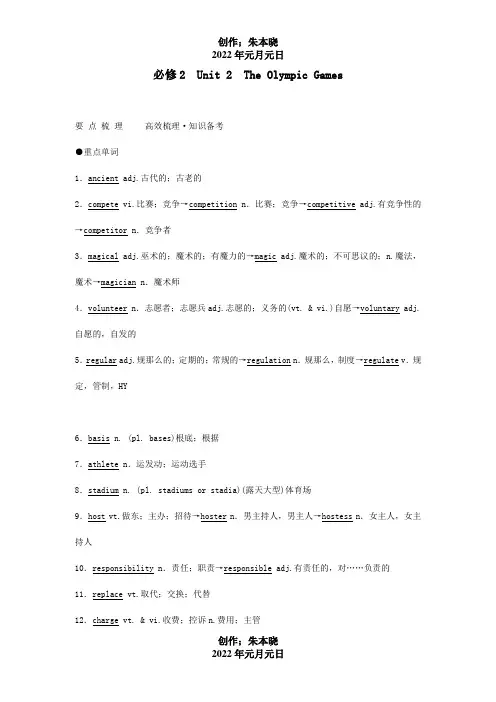
必修2 Unit 2 The Olympic Games要点梳理高效梳理·知识备考●重点单词1.ancient adj.古代的;古老的2.compete vi.比赛;竞争→competition n.比赛;竞争→competitive adj.有竞争性的→competitor n.竞争者3.magical adj.巫术的;魔术的;有魔力的→magic adj.魔术的;不可思议的;n.魔法,魔术→magician n.魔术师4.volunteer n.志愿者;志愿兵adj.志愿的;义务的(vt. & vi.)自愿→voluntary adj.自愿的,自发的5.regular adj.规那么的;定期的;常规的→regulation n.规那么,制度→regulate v.规定,管制,HY6.basis n. (pl. bases)根底;根据7.athlete n.运发动;运动选手8.stadium n. (pl. stadiums or stadia)(露天大型)体育场9.host vt.做东;主办;招待→hoster n.男主持人,男主人→hostess n.女主人,女主持人10.responsibility n.责任;职责→responsible adj.有责任的,对……负责的11.replace vt.取代;交换;代替12.charge vt. & vi.收费;控诉n.费用;主管13.physical adj.物理的;身体的→physics n.物理→physicist n.物理学家→physician n.内科医生14.advertise vt. & vi.作广告;登广告→advertisement n.广告→advertiser n.广告客户15.hopeless adj.没有希望的;绝望的→hope v. & n.希望→hopeful adj.充满希望的16.bargain vi.讨价还价;讲条件 n.廉价货17.deserve vi. & vt.应受(报答或者惩罚);值得●重点短语1.take part in 参加2.stand for 代表3.every_ four years 每四年4.a set of 一组;一套5.be admitted to 被准许进入6.play an important role in 在……中起重要作用7.as well 也,又,还8.in charge 主管;看管9.one after another 陆续地;一个接一个地10.pick up 拾起●重点句型1.I lived in what you call“Ancient Greece〞 and I used to write about the Olympic Games a long time ago. 我生活在你们所说的“古希腊〞,我曾经写过很久以前奥林匹克运动会的情况。
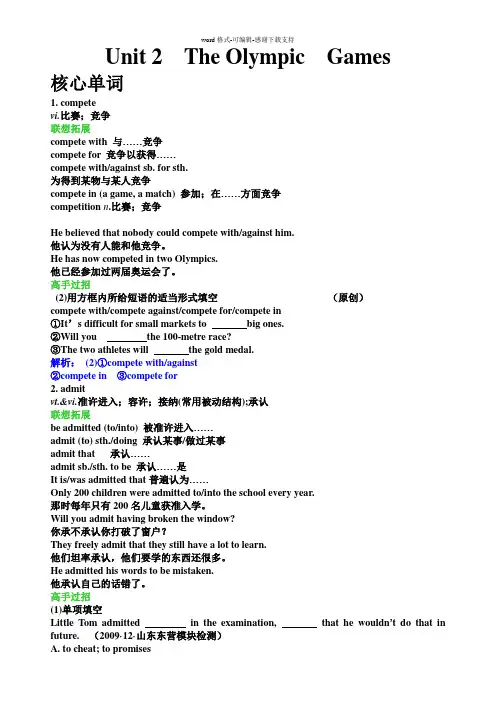
Unit 2 The Olympic Games核心单词1. competevi.比赛;竞争联想拓展compete with 与……竞争compete for 竞争以获得……compete with/against sb. for sth.为得到某物与某人竞争compete in (a game, a match) 参加;在……方面竞争competition n.比赛;竞争He believed that nobody could compete with/against him.他认为没有人能和他竞争。
He has now competed in two Olympics.他已经参加过两届奥运会了。
高手过招(2)用方框内所给短语的适当形式填空(原创)compete with/compete against/compete for/compete in①It’s difficult for small markets to big ones.②Will you the 100-metre race?③The two athletes will the gold medal.解析:(2)①compete with/against②compete in ③compete for2. admitvt.&vi.准许进入;容许;接纳(常用被动结构);承认联想拓展be admitted (to/into) 被准许进入……admit (to) sth./doing 承认某事/做过某事admit that 承认……admit sb./sth. to be 承认……是It is/was admitted that普遍认为……Only 200 children were admitted to/into the school every year.那时每年只有200名儿童获准入学。
Will you admit having broken the window?你承不承认你打破了窗户?They freely admit that they still have a lot to learn.他们坦率承认,他们要学的东西还很多。
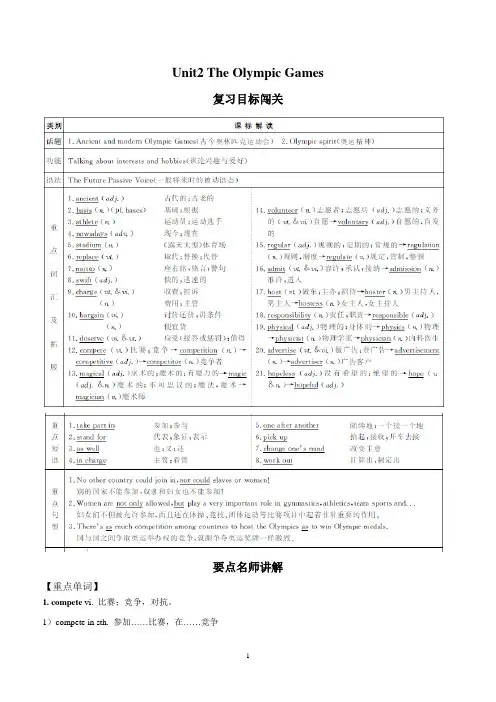
Unit2 The Olympic Games复习目标闯关要点名师讲解【重点单词】1. compete vi. 比赛;竞争,对抗。
1)compete in sth. 参加……比赛,在……竞争I hope to compete in the English contest. 我盼着去参加英语竞赛2)compete for 为得到---而竞争宾语常用championship(leadership, the post, the gold medal, the scholarship, the contract) 竞争冠军(领导权、职位、金牌、奖学金、合同)She is competing for the title, Miss America. 她在竞争美国小姐的桂冠3)compete with/against 与……竞争We can’t compete with them on price. 我们在价格上无法与他们竞争【拓展延伸】competitor 参赛者;competition 竞争competitive adj.竞争的,竞争性的【点拨】辨析compete, contestcompete指为争得名次、奖品、合同等而进行的,没有征服对手之意。
Contest指友谊竞赛或敌意的竞赛,侧重于比试技能、能力、力气、耐力等How many students are contesting in the spoken English match? 有多少学生参加英语口语赛?【即境活用】We can’t ____other countries in trade if we don’t develop our national economy.A. compete forB. compete againstC. catch upD. catch with【解析】B 考查动词短语辨析。
按照句意此处有与---竞争之意;compete---against符合。
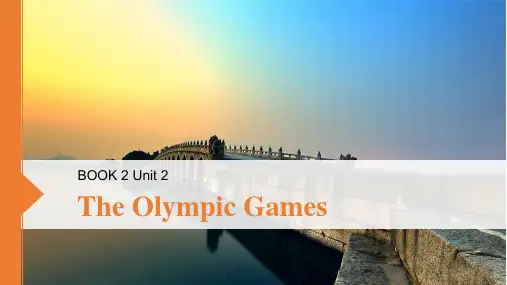
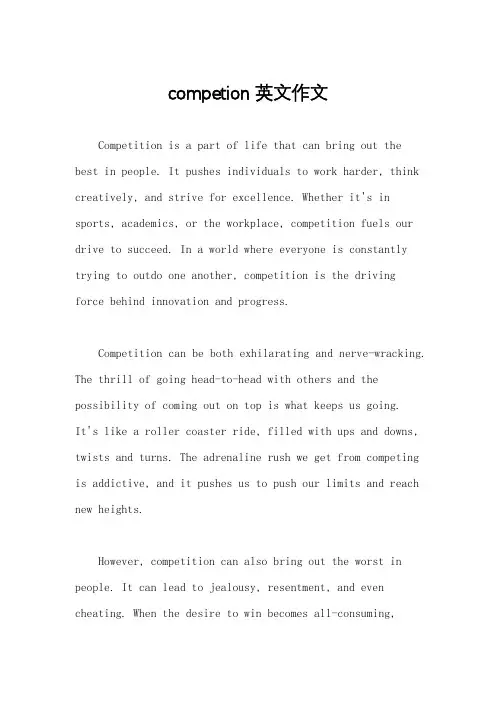
competion英文作文Competition is a part of life that can bring out the best in people. It pushes individuals to work harder, think creatively, and strive for excellence. Whether it's in sports, academics, or the workplace, competition fuels our drive to succeed. In a world where everyone is constantly trying to outdo one another, competition is the drivingforce behind innovation and progress.Competition can be both exhilarating and nerve-wracking. The thrill of going head-to-head with others and the possibility of coming out on top is what keeps us going.It's like a roller coaster ride, filled with ups and downs, twists and turns. The adrenaline rush we get from competing is addictive, and it pushes us to push our limits and reach new heights.However, competition can also bring out the worst in people. It can lead to jealousy, resentment, and even cheating. When the desire to win becomes all-consuming,individuals may resort to unethical means to gain an advantage. The pressure to succeed can be overwhelming, and some may crack under the weight of expectations.Yet, competition is essential for personal growth and development. It teaches us valuable life skills such as perseverance, resilience, and teamwork. It pushes us to step out of our comfort zones and take risks. It forces us to confront our weaknesses and work on improving ourselves. Without competition, we would become complacent and stagnant.Competition also fosters innovation and progress. When individuals and companies compete against each other, they are constantly striving to come up with new ideas and solutions. This leads to advancements in technology, medicine, and various other fields. Without competition, there would be no motivation to innovate and improve.In conclusion, competition is a double-edged sword. It can bring out the best and worst in people. It can be thrilling and challenging, but also stressful and intense.However, competition is necessary for personal growth, development, and progress. It pushes us to work harder, think creatively, and strive for excellence. So, embrace competition and let it drive you towards success.。
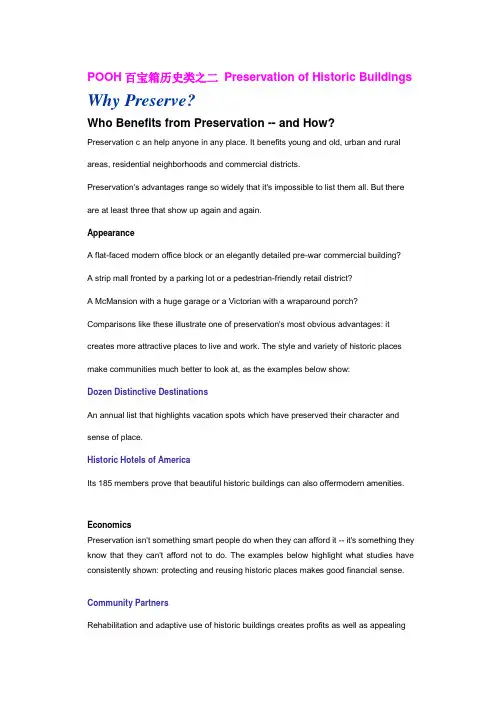
POOH百宝箱历史类之二Preservation of Historic Buildings Why Preserve?Who Benefits from Preservation -- and How?Preservation c an help anyone in any place. It benefits young and old, urban and rural areas, residential neighborhoods and commercial districts.Preservation's advantages range so widely that it's impossible to list them all. But there are at least three that show up again and again.AppearanceA flat-faced modern office block or an elegantly detailed pre-war commercial building?A strip mall fronted by a parking lot or a pedestrian-friendly retail district?A McMansion with a huge garage or a Victorian with a wraparound porch? Comparisons like these illustrate one of preservation's most obvious advantages: it creates more attractive places to live and work. The style and variety of historic places make communities much better to look at, as the examples below show:Dozen Distinctive DestinationsAn annual list that highlights vacation spots which have preserved their character and sense of place.Historic Hotels of AmericaIts 185 members prove that beautiful historic buildings can also offermodern amenities.EconomicsPreservation isn't something smart people do when they can afford it -- it's something they know that they can't afford not to do. The examples below highlight what studies have consistently shown: protecting and reusing historic places makes good financial sense.Community PartnersRehabilitation and adaptive use of historic buildings creates profits as well as appealingplaces to live and work.Heritage TourismTowns and cities that protect their historic areas attract more visitors, and those people stay longer and spend more.National Main Street CenterInvesting in traditional commercial districts both produces new jobs and eliminates the cost of sprawl, such as time lost in the car and the expense of providing new infrastructure like roads.History and CultureHistoric places tell a community where it came from -- what previous generations achieved, what they believed, what they hoped to be. By protecting these reminders of the past, preservation also builds the present and the future, since it saves valuable resources and recalls a community's goals and dreams, as these examples show:Issues and PoliciesProtecting the buildings at the heart of American life, such as neighborhood schools and downtown commercial districts, is crucial to creating better communities.Why Preserve?What's the Truth About Preservation?There's lots of "facts" around about what preservation is and does. Unfortunately, some information is more accurate than others. The following list considers seven of the most common misperceptions.∙Preservation is only for high-style buildings associated with famous dead rich people.∙Preservation is too expensive.∙If my house is listed on a historic register or located in a historic district, I lose all my property rights to the government.∙If a place is listed on an historic register, it's safe from demolition.∙Preservation is bad for business.∙Old buildings aren't safe.∙Preservation only cares about the past.Myth: Preservation is only for high-style buildings associated with famous dead rich people.Reality: Preservation actually involves every aspect of America's past. Preservation cares about the homes of the rich and the poor, industrial sites and downtown commercial districts, schools and colleges, religious sites and governmental buildings, parks and other places for recreation, rural landscapes and structures -- just about any place that helps tell America's story.Myth: Preservation is too expensive.Reality: Good preservation does have costs -- but not preserving costs even more. Demolition has significant expenses: workers who tear down a historic place and carryaway the debris must be paid, ugly landfills must be provided to receive construction materials. Additional costs appear if a "replacement" goes in an undeveloped area, since building on open spaces requires creating and maintaining services like roads and sewers.Recent projects prove that preservation is often cheaper. In Chicago, where the public school system is now spending $2.5 billion to upgrade facilities, bare-bones new construction is costing $155 per square foot -- but renovation is costing just $130. Destroying our past has costs that extend far beyond money. Lost is the work of talented craftsmen who created beautiful, lasting buildings. Lost are the memories and pride that a community took in one of its landmarks. And lost is the opportunity for future generations to enjoy and to learn from the places that help us understand and appreciate where we came from.Myth: If my house is listed on a historic register or located in a historic district, I lose all my property rights to the government.Reality: There are many variations on this theme:∙I won't be able to change anything about my house, such as paint color or landscaping or plumbing, without the approval of the "history police."∙I have to open my house for tours.∙I won't be able to sell my house.None of those statements is true. No one from the local, state, or federal government, for example, is going to block the installation of a dishwasher or hot-water heater. Historicreview boards may evaluate major projects, but these locally-chosen boards also give homeowners the opportunity to present their case for making changes. Though many people choose to open their homes to once-a-year neighborhood tours, no one has to give the public access. And it's becoming increasingly clear that being part of a historic district may actually improve property values, since potential buyers know that their community will escape the kind of every-man-for-himself development that ultimately leaves everyone poorer.Myth: If a place is listed on an historic register, it's safe from demolition.Reality: Unfortunately, buildings that are important enough to have made a local, state, or national register can still be torn down. Listing in the National Register of Historic Places, for example, does provide some protection, since a project built with federal money -- like a highway -- must consider its impact on historic resources, but even then, historic resources can be damaged or destroyed if there is no "feasible" alternative.Because legal protection is limited, it's vital for communities to fight for their historic places. Few new projects -- roads, offices, stores -- have to be built in a specific place in a particular way. Citizens can make sure that their elected officials understand the need to protect the historic places, and find ways to combine the best of the old and the new. Myth: Preservation is bad for business.Reality: Preservation is actually a good business -- and a big one. A recent travel industry survey found that more than 40% of Americans made visiting a historic place -- a building, battlefield or historic community -- part of their vacations, and that these people spent nearly 40% more than the typical traveler. Communities participating in the National Trust's Main Street program, which revitalizes traditional commercial districts, have generated more than $16 billion in private and public investment since 1980.Preservation is also better business than new construction. A study shows that$1,000,000 spent on rehabilitation will create more jobs and keep more money in the local economy than the same $1,000,000 spent on new construction.Myth: Old buildings aren't safe.Reality: It's not the age of buildings that makes them safe from forces like fire and earthquakes and hurricanes -- it's how they're built. Recent disasters have shown that older, carefully constructed buildings may stand up better. In 1992's Hurricane Andrew, for example, it was new, cheaply built structures that suffered the most damage.What's equally important is that old buildings can adopt new safety methods. Historic schools and office buildings can be retrofitted with modern fire-surpression systems and seismic reinforcement. In the early 1990s, Stanford University showed how modern techniques could preserve and strengthen buildings that had been damaged by an earlier earthquake.Nor does preservation increase the danger from hazards like asbestos and lead paint. If an older building includes either of those materials, they have to be abated whether the structure is demolished or rehabilitated, and often preservation creates less danger because it does not expose the hazards to the air.Myth: Preservation only cares about the past.Reality: Preservation does care about the past. It cares about honoring the achievements of previous generations, the places they lived and worked, and the history and achievements we now enjoy.But preservation also cares about the present and the future. By protecting our past, it helps us remember how we came to be where we are and what we ought to do now. And it cares about giving future generations the same opportunities to enjoy beautiful buildings and landscapes that we have today.。
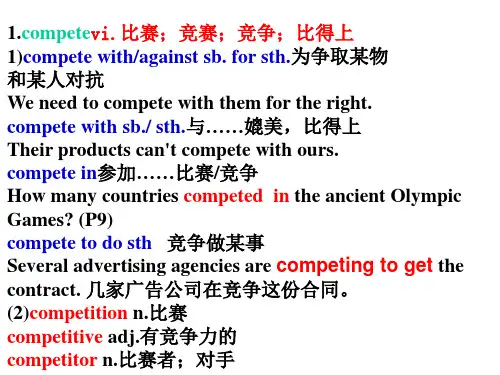

高考英语核心考点归纳--必修二unit 2pete vi.比赛;竞争【教材原句】Our Greek cities used to compete against each other just for the honour of winning.我们希腊各个城市之间曾经为了赢得荣誉而彼此竞争过。
派生competitive adj.竞争性的competition n.竞争;比赛competitor n.竞争者;参赛者领悟高考·究考法「◆用compete的适当形式填空」(1)It enables small-scale farmers to harvest 175 pounds of green vegetables per hour,suddenly making it possible for the little guys compete with/against large farms of California.这使得那些小规模农场的农民每小时能收割175磅的绿色蔬菜,从而使得他们也能与加利福尼亚的大农场一较高下。
(2)How many countries competed in the ancient Olympic Games?有多少国家参加古代奥运会?(3)Competition is fierce and the chief prize is a complete Stilton cheese.比赛非常激烈,大奖就是一个完整的斯提耳顿奶酪。
(4)All the competitors are served with beer or port wine.所有的参赛者都可以喝啤酒或者波特酒。
联想拓展·记考点(1)compete with/against sb.for sth.为争取某物和某人竞争(2)compete with sb./sth.与(某人/某物)媲美,比得上(通常用于否定句)(3)compete in 参加……的比赛、竞争(4)be in competition with 与……竞争2.take part in参加【教材原句】Who could not take part in the ancient Olympic Games?谁不能参加古代奥运会呢?领悟高考·究考法「◆完成句子」(1)You will be able to take part in a number of activities from canoeing to wild camping on Dartmoor.你可以在达特穆尔参加许多活动,从乘独木舟到野营都行。
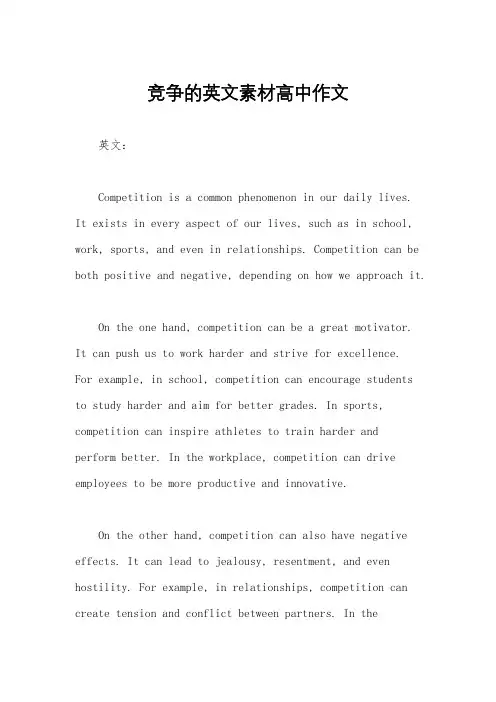
竞争的英文素材高中作文英文:Competition is a common phenomenon in our daily lives.It exists in every aspect of our lives, such as in school, work, sports, and even in relationships. Competition can be both positive and negative, depending on how we approach it.On the one hand, competition can be a great motivator.It can push us to work harder and strive for excellence.For example, in school, competition can encourage studentsto study harder and aim for better grades. In sports, competition can inspire athletes to train harder andperform better. In the workplace, competition can drive employees to be more productive and innovative.On the other hand, competition can also have negative effects. It can lead to jealousy, resentment, and even hostility. For example, in relationships, competition can create tension and conflict between partners. In theworkplace, competition can lead to a toxic work environment, where employees are constantly trying to outdo one another, rather than working together towards a common goal.In my opinion, competition is necessary, but it should be approached in a healthy and balanced way. We shouldstrive to compete with ourselves, rather than with others. We should focus on our own personal growth and development, rather than comparing ourselves to others. This mindset can help us to avoid the negative effects of competition and instead, use it as a tool for self-improvement.中文:竞争是我们日常生活中常见的现象。
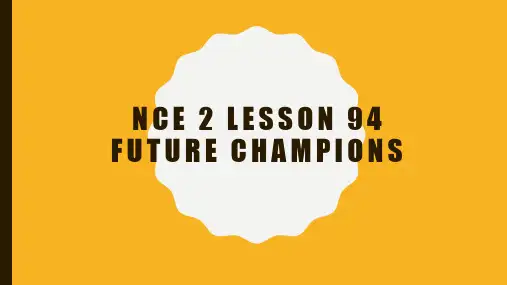
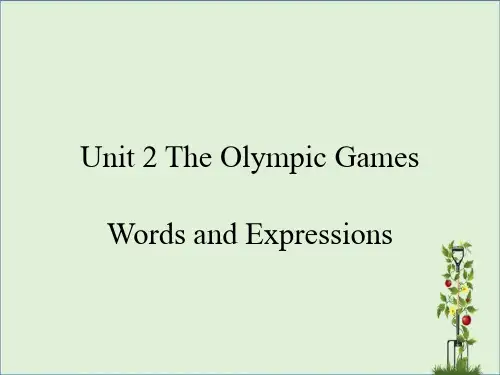
【学以致用】一、重点词汇细解1.compete vi. 比赛;竞争(教材原句)How many countries competed in the ancient Olympic Games?有多少国家参加古代奥运会?【归纳拓展】①compete for 为……而竞争compete in 参加比赛compete to do sth. 竞争做某事compete with/against 与……竞争②competition n. 竞争 attend a competition 参加竞赛competitor n. 参赛者competitive adj. 竞争的;有竞争性的(1)Runners from many countries are the international prize.来自许多国家的赛跑运动员正在为获得这项国际奖而竞争。
(2)The firm is too small to large international companies.这个公司太小,不能与跨国大公司竞争。
(3)There is now intense (compete) between schools to attract students.现在学校之间为了招揽学生展开了激烈竞争。
【语境助记】As the youngest competitor,I had to compete in the writing contest against/with 20 other top students for the writing award.I must be very competitive to be the winner.作为最年轻的比赛者,我必须和另外20个顶尖的学生在写作比赛中竞争以获得这次写作奖。
要成为获胜者,我必须有很强的竞争力。
2.admit vt.&vi. (admitted; admitted) 容许;承认;接纳(教材原句)Only athletes who have reached the agreed standard for their event will be admitted as competitors.只有达到他们各自项目统一标准的运动员才会被接受参加奥运会。
competion英文作文英文:Competition is a common phenomenon in our daily lives. In school, we compete for good grades and awards. In the workplace, we compete for promotions and recognition. Even in sports and hobbies, there is often a sense of competition. 。
Competition can be both positive and negative. On the positive side, it can motivate us to work harder and strive for excellence. For example, when I was in high school, I participated in a public speaking competition. The thought of competing against my peers pushed me to prepare and practice my speech diligently. As a result, I ended up winning the first prize, which boosted my confidence and public speaking skills.On the negative side, competition can also create stress and anxiety. It can lead to feelings of inadequacyand self-doubt, especially when we compare ourselves to others. For instance, in my previous job, there was a constant competition among colleagues to impress the boss and get ahead. This led to a toxic work environment where people were more focused on outdoing each other rather than working together as a team.中文:竞争是我们日常生活中常见的现象。
Literature competition in the a ncientO lympic games古代奥运会之文艺比赛Did y ou know that literature was also o ne of competitions in the ancient Olympic Games?Those who participated in this co m-petitio n w ere poets,writers,speakers and so on and so forth.当时被誉为希腊“历史之父”的格罗多特宣读了他的名作《历史》中的某些章节,歌颂了公元前490年在马拉松河谷战役中大败波斯军队的希腊战士,最终赢得首次文艺比赛的桂冠。
Theprizes fo r the w inners in literature co mpetition were even greater than those giv en to spo rts w in-ners.如公元前338年马其顿征服希腊后的一届奥运会曾将属于体育比赛的奖励全部奖给了诗人。
Competitions for young people in thea ncient Olympic games古代奥运会之少年比赛Did yo u know that young peo ple had al-ready participated in the Games?公元前632年第37届奥运会开始设置了少年比赛的项目,竞技者年龄限定为17~20岁。
比赛项目除一些专门为少年选手设立的以外,M o st of the g ames are similar to tho se for adults,such as running,w restling,pentathlon,boxing,and so on.形式和内容也基本一致,只是在规则的要求、动作的难度方面要低于成年人。
Unit1词汇讲义拓展competition英[ˌkɒmpəˈtɪʃn]美[ˌkɑ:mpəˈtɪʃn]第三人称复数:competitionscompetition 基本解释名词竞争; 比赛; 竞争者; [生]生存竞争competition 相关例句名词1. Competition among youths to enter the best colleges is intense.年轻人想进一流大学的竞争是很激烈的。
2. Keen competition for first place.为竞争第一名激烈角逐。
3. He was in competition with 10 others for the job.为得到这份工作他与10个人展开竞争。
4. I entered a chess competition and finished third.我参加了象棋比赛名列第三。
5. He takes part in a swimming competition.他参加游泳比赛。
competition 网络解释1. 竞争競爭:或一种生活于另一种体内,互相依赖,24、竞争:竞争(Competition)是指同种或异种的两个或更多个体间发生对于环境资源和空间的争夺而产生的一种生存斗争现象25、他感作用:他感作用(alleloparthy)就是一种植物通过向体外分泌代谢过程中的化学物质, competition 词典解释1. 竞争;角逐Competition is a situation in which two or more people or groups are trying to get something which not everyone can have.e.g. There's been some fierce competition for the title...夺冠之争一直都相当激烈。
POOH百宝箱社会类之二----Competition & CooperationSelf-Supporting, Competition or Cooperation: An IntroductionFrom: /~felsing/ala/ahwang.htmlCompetition and cooperation are two driving forces for the advancement of human civilization. Any one who is not interested in competition or cooperation will be left out and left behind.Competition is a way of life in today's world. The capitalist society encourages competition. Individuals and companies alike, for the sake of survival in competition, must continue to improve their services and products, and as a result, the entire society prospers, at least economically. Cooperation in the form of monopoly or price-fixing is illegal in the capitalist world as it kills the spirit of competition. American people do not allow their governments to operate any business as they believe that the government-run business will be ineffective due to lack of competition. China has certainly experienced the vitality of this competitiveness in the past decade since her adoption of the "Reform and Opening Up" policy.In the past decade, we have seen computers shrinking in size, increasing in power, and declining in price. We have also seen a rapid expansion of telecommunications networking at a reducing price. All of these good things happen only because of competition.We witness competition not only in business alone. Competition appears in many forms. The Olympic Games is a form of competition, and so are college or university entrance examinations and presidential elections. Although competition advances human civilization, it also separates winners from losers. It can not, and does notproduce win-win situation. (双赢的结果)As a result of competition, some are happy and others sad (Ji Jia Huan Le, Ji Jia Chou).Competition is not always a good thing to have. As we all know, competition in the form of arms race among powers is a waste of limited resources that we have on this planet, and will bring massive destruction to humankind. Sibling rivalry is another form of competition that is not healthy. It will inscribe damaging scars in the heart of family members.Is competition a proper driving force for the advancement of libraries and information centers? If librarians and information professionals compete and take pride in improving access to information for their patrons and in reducing the cost of the access, this limited sense of competition is healthy and a good thing to have. Competition is necessary only when there is not enough room for everybody to be a winner. However, the cost of competition is very high. Librarians and information professionals are not in the business to compete against one another.Opposite from competition is isolation in the name ofself-supporting. The Chinese saying, "making a buggy behind a closed door" (Bi Men Cao Ju)(闭门造车?)signifies an attitude that leads to failure. In view of ever increasing speed of transportation and telecommunications, we live in a global village. Interaction and interdependence are no longer a luxury or an option, unless one wishes to be left out and left behind.In short, competition is in order when there is not enough room for everyone to be a winner, and therefore, competition is to separate winners from losers. On the other hand, cooperation is the only driving force that will make every participant a winner.The benefit of cooperation is beautifully summed up in Ecclesiastes 4:12 of the Bible as follows:Though one may be overpowered,two can defend themselves.A cord of three strands is not quickly broken. Cooperation among libraries and information centers makes every one a winner. Over 23,000 libraries in 63 countries and territories that are users of OCLC can testify the benefit the cooperation, as OCLC represents the most successful story of cooperation of libraries and information centers throughout the world.Co-Opetition vs CompetitionWhen Cooperating With Your Competitors is Good Business StrategyBy: John SheplerThere is an odd but effective business principle that goes by the name co-opetition. It's a combination of cooperation and competition that offers the counter intuitive possibility for rivals to benefit from each other's seemingly competitive activities. In short, there are circumstances where having more players to cut the pie means bigger pieces of pie for everyone. That'sco-opetition.That's not the way most of us learned to deal with the world. We've been taught that to get anywhere you need to be a player, and players are competitive. After all, there is only so much to go around. You'll have to fight to get your share of theeconomic pie. You have to dive in there and get your piece of that pie before there's nothing left but crumbs. Worse yet, it's a shrinking pie. The pieces are getting smaller and harder to come by. Reach in. Grab a slice and run before someone mugs you and takes even that away.This is competition. It has winners and losers. We've all watched the Olympics. Anybody can see that there is only one tallest podium for the gold medal and two shorter ones for the silver and bronze. After that it's nothing. Just the anonymity of the also-rans, those who didn't make it to the top and now fade into obscurity. Losers.Who is your competition? Everyone. Well, at least everyone who is after the same things that you are. Remember the pie and the medals. You have to get there first and strongest. If you can't do that, you at least have to find a way to hold everybody else back. Business is sometimes referred to as war, with the metaphors of war: "killing" the competition, "beating" them bloody.Now we all know that life isn't pure competition. If it were, the stress would kill us at an early age. We wouldn't get very far either, with everyone fighting everyone else over every little issue. We'd soon starve...if we lived that long. No, there is another side to relationships called cooperation. Call it family, call it friendship, call it mutual support. We get together in groups to do those things that are larger than one person. We design airplanes, build roads and play basketball in teams. We gladly help others to win because we know that when they win, we win too. How could a basketball team ever win a game if every player who got the ball hogged it to themselves and took whatever shot they could? No, it's the team score at the end that matters and determines who wins the game. If our team wins, we all win. If their team wins, they all win and we all lose. Or do we?What if one team were allowed to exercise the full wealth of whoever owned them. Say they had billions of dollars at their disposal for player salaries, facilities, broadcast rights, and so on. All the other teams would have some small fraction of this to spend. Wouldn't this one team now become the greatest contender of all time? They'd hire all the best players and soon be the undisputed champions of the league. Wouldn't people flock to seethis winning phenomenon in action week after week, year after year?Well, not for long. You see, what fans want is a game not a sure thing. This "super team" would destroy the game by winning all the time. It is actually in their best interest when the other teams win, because that creates the excitement that draws people into watching the next game. The competitors are really allies in the larger sense of creating a business that continues to generate revenues to pay those big salaries. All players are winners because they get paid generously to play a game they love, and also have a chance of winning more games than they lose and even becoming an individual "star player."(难道NBA就是这种理念的实践?今年季候赛多少有点这种味道)You see the same thing in retail stores. Having many car dealers or antique stores in close proximity actually helps business for all because people know they will have a great choice when they drive to this shopping "center." In the case of the antique dealers, you might find a table at one dealer, chairs at another and a lamp at still another. No one dealer gets all the business, but they all benefit from selling items that make up a set or collection. The individual pieces might otherwise sit unsold.So, is your competitor your friend or your enemy? It's a little hard to sort out isn't it? Let's get back to the notion of a pie again. Pies are always a certain size or shrinking, right? No,you can always make more pies. Consider the computer pie. In the fifties, the pioneers in computing thought there might be a market for just a handful of computers in the entire world. The big names, IBM and Univac, were in a fierce competition for that small, but lucrative pie. Then along came some unknowns named Digital Equipment Corporation and Data General. They created another pie known as the minicomputer. This pie was in addition to the mainframe pie, not in place of it. Somewhat more recently, the biggest pie of all, the personal computer industry, popped up suddenly and out of seemingly nowhere. Are any of us not installing a mainframe or minicomputer in our homes because we bought a PC instead? Of course not. We're part of a market, a pie if you will, that didn't exist until very low cost hardware and software became available.Nor do we have to fight over the pie. Even if there is one and only one pie on the counter and two people who want it, there is a way for each to get more than half? There is? Oh, yes. What if one person preferred filling and the other preferred crust? Cut the pie so that one piece has most of the filling and the other has the lion's share of crust, and each party will think they got the best of the deal.Consider this. Are United and American Airlines competitors or allies? The instant answer is "why competitors, of course." That's true. When it comes to passengers, landing slots and airport gates, they are rivals seeking pieces of the same limited pie. But, when it comes to building new aircraft, they assume a different role. Both airlines are now complementors of each other's business because together they create a larger pool of potential airplane sales for Boeing. Where there is sufficient demand for a new type of aircraft, then the development costs that run into the billions of dollars can be justified. Both airlines benefit from the combined marketplace that they mutually create.How about in the defense arena? Wouldn't you say that each of the big defense programs competes with all others for our tax dollars. In a sense they do, when the time comes to pick and choose for limited funds. Yet, a program such as the F-22 fighter benefits from other defense programs that shared common development activity. Examples are avionics and navigation. If any of those programs had been killed, the fixed and overhead costs that were supported by both would have been carried by the F-22 alone, which still needs those systems to fly. The result is that fewer fighters would built because they now appear to cost more per plane. Sometimes an apparent cost savings in one area can cause havoc and higher costs in another. In industry as in drama, it really is a tangled web we weave.These paradoxes can be better understood through something called a value network, as described in the book "Co-Opetition" by Adam M. Brandenburger, Ada Brandenberger; and Barry J. Nalebuff. Co-opetition is the delicate balance of cooperation and competition that describes many business relationships. A value network, or Value Net, is a map that helps visualize the tangled web of interconnections in the game of business.Imagine drawing a square on paper. The top side would be labeled "customers." The opposite side, the bottom, is labeled "suppliers." The left side is "competitors" and the right side is "complementors." Right in the middle is your "company." Now, draw lines from your company to each of the four sides and also lines from each of them to the adjacent others. With this schematic in hand, we're ready to understand the relationships involved."A player is your complementor if customers value your product more when they have the other player's product than when they have your product alone." Most people, especially new buyers, are more inclined to buy a computer that comeswith software than one that doesn't. Oscar Mayer hot dogs and Coleman's mustard also complement each other, not compete for the same dollars. People like hot dogs with mustard more than they like plain hot dogs."A player is a competitor if customers value your product less when they have the other player's product than when they have your product alone." Coke and Pepsi go head to head. So do American and United for passengers. Telephone and cable TV companies have been complementors in sharing the cost of poles to run wires to the same houses. Soon they'll be fierce competitors for Internet access and even telephone service. Companies in completely different industries, such as Microsoft and Citibank, might become competitors as the world shifts to electronic commerce where each might have a strategic advantage.Suppliers also figure in this dual role in that other companies are complementors if it is more attractive for someone to supply you when there are also other players in the game, than if you are the only one buying. Remember new aircraft development? New microprocessors are also more attractive to develop when there are lots of companies making personal computers than only a few. Electronic parts are cheaper when there is a huge demand, although preferably from anon-competing product.A company is a competitor when it is less attractive to supply you when there are other people buying. When gasoline is in short supply, the last thing you want to see is more competing cars on the road, if you are a driver. Although, you also know that without millions of cars, there would be no superhighways and that service stations would be fewer and farther between. It is a complex web we weave, isn't it? Relationships, personal or business, can be hard to sort out and often are not so clearly defined as complementary orcompetitive. They are both. As Brandenburger and Nalebuff describe, it's not War and Peace as Tolstoy wrote of the endless cycles of war followed by peace followed by more war. It's war and peace at the same time. That's the strange world of co-opetition.Working with othersThe Hard Part of TeamworkGrading My Teamwork ExperiencesI’d like to be able to work more as a team with co-workers.I realize I need to plan and talk more with others. I don’t find it easy. A lot of what I do is done on my own. How can I work more as a team?The Hard Part of TeamworkTeamwork is the buzzword of the decade. It’s the hot managerial strategy. The thinking is this: In thissuper-modern world, tasks are more complex and there are more specialists:This teamwork idea can sound easy. But, it can be very hard. In an orchestra, in the workplace, in the creation of a film, on many jobs, we know that we have to work in teams.Whether we like it or not, we are partners with a large number of people. Our own experience tells us that partnership does not always run smoothly. Even when we are put into teams, we continue to be judged as individuals. That’s one reason why teamwork—which is supposed to make things easier—may actually cause stress in the short run.Why Teamwork is important∙No man is an island and no employee can work without a team.∙Increase productivity by reducing man-hours lost to employee conflicts.∙Reduce employee turnover by creating a better work environment.∙Show employees the importance of working as a team to achieve goals.相关issue题目:竞争的利弊Competition is ultimately more beneficial than detrimental to society.【2】归根结底,竞争对于社会是利多弊少。